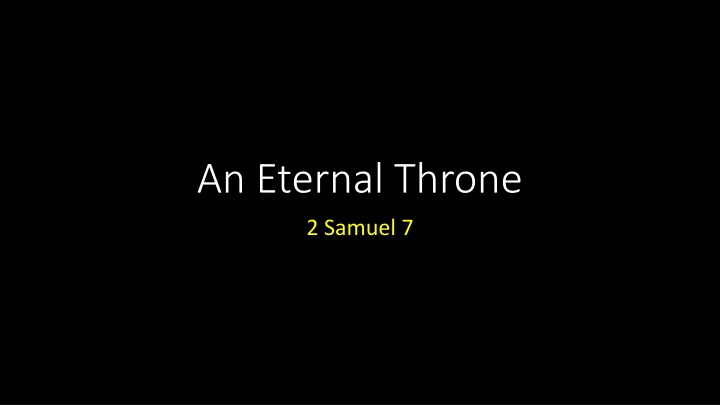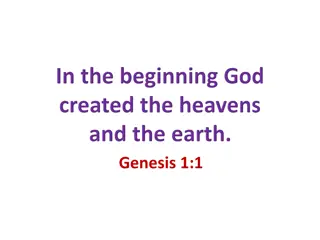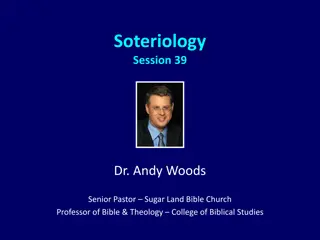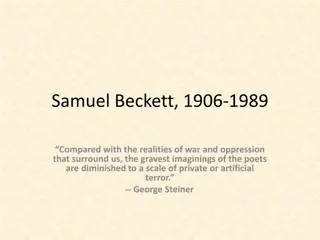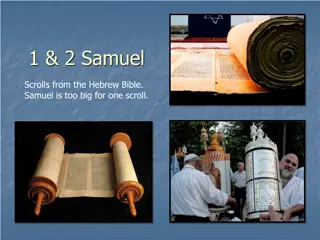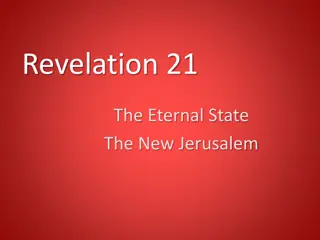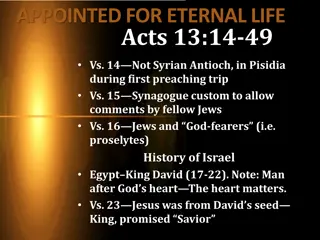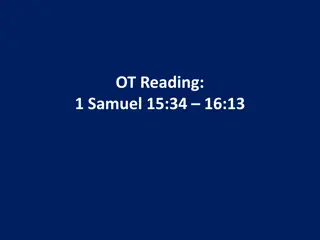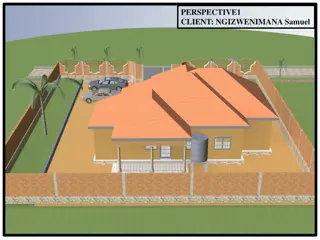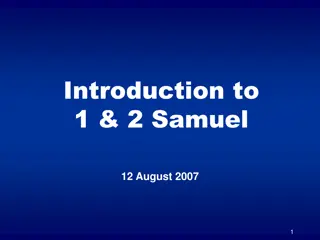Delving into 2 Samuel 7: Exploring the Eternal Throne and God's Promise
Explore the profound insights of 2 Samuel 7, a pivotal chapter in the Old Testament that unveils God's eternal plan and promise. Journey through David's desire to build a temple, God's redirection of the task to Solomon, and the everlasting covenant established. Witness the divine connection from David to Jesus Christ, as we unravel the significance of this chapter in the overarching narrative of the Bible.
Download Presentation

Please find below an Image/Link to download the presentation.
The content on the website is provided AS IS for your information and personal use only. It may not be sold, licensed, or shared on other websites without obtaining consent from the author.If you encounter any issues during the download, it is possible that the publisher has removed the file from their server.
You are allowed to download the files provided on this website for personal or commercial use, subject to the condition that they are used lawfully. All files are the property of their respective owners.
The content on the website is provided AS IS for your information and personal use only. It may not be sold, licensed, or shared on other websites without obtaining consent from the author.
E N D
Presentation Transcript
An Eternal Throne 2 Samuel 7
An Eternal Throne Introduction The Old Testament has a few chapters or passages that we can think of as major landmarks. One of these is 2 Samuel 7. It is one of the keys to understanding God s plan the big story of the Bible from beginning to end.
An Eternal Throne Introduction Old Testament specialist Walter Kaiser sees four mountain peaks in what he calls the Promise-Plan of God. They are: Genesis 3:15 Genesis 12:2-3 2 Samuel 7 Jeremiah 31:31-34.
An Eternal Throne Introduction In 2 Samuel 7, we will see a connection that leads us directly from David to Jesus Christ. For example: Matthew 15:22, 20:30-31, 21:6-11
Davids Desire 2 Samuel 7:1-3 David s desire was good. He now lived in a palace. He wanted to build a temple to the Lord. Nathan the prophet agrees. He sees the Lord s blessing upon David s life. He sees the pure motives of David s heart.
Davids Desire 2 Samuel 7:1-3 But the Lord had not yet spoken. The building of the temple was not to be David s work, but Solomon s. David would gather materials and leave them for his son.
Davids Desire 2 Samuel 7:1-3 If you cannot have what you hoped, do not sit down in despair and allow the energies of your life to run to waste; but arise, and gird yourself to help others to achieve. If you may not build, you may gather materials for him that shall. F. B. Meyer (1847 1929)
Gods Promise 2 Samuel 7:4-17 The key to understanding this promise is a play on words involving two meanings of the word house. A house can be the structure in which we live or in this case a temple for the Lord. It can also be a dynasty of kings.
Gods Promise 2 Samuel 7:4-17 Again, Solomon, not David, would build the temple. God would establish the house of David as a permanent dynasty over Israel. Beginning in 7:13, the word forever appears 8 times in this chapter.
Gods Promise 2 Samuel 7:4-17 Nupanga Weanzana, Dean of Bangui Evangelical School of Theology (B.E.S.T.), Central African Republic, comments, God s choice of David and his descendants marked an important turning point in the spiritual life of God s people. From then on, the future of God s people was linked to solidarity with the family God had chosen.
Gods Promise 2 Samuel 7:4-17 Nupanga Weanzana, Dean of Bangui Evangelical School of Theology (B.E.S.T.), Central African Republic, comments, This is why the northern tribes who later separated from Judah were considered apostate, even though they represented the majority of the Israelites. Their separation from and rejection of David s dynasty was seen as a refusal to submit to the will of God.
Davids Prayer 2 Samuel 7:18-29 David had desires, but he was also prepared to be fully submitted to God s will. He could see that whatever God wanted, it was bigger and better than anything he alone could achieve.
Davids Prayer 2 Samuel 7:18-29 David s prayer exemplifies the proper response of a believer to God s revealed will. Rather than mourn the loss of the privilege of building the Temple, David rejoiced in the promise of future blessing and acknowledged God s sovereignty. Charles Ryrie
Davids Prayer 2 Samuel 7:18-29 7:18 This combination of titles for God is unusual in Scripture. It appears 6 times in the Bible before this. David uses it 5 times here. The first 2 times are in Genesis 15, where Abraham is speaking to God about the covenant God made with him. O Lord God = Adonai Yahweh
Davids Prayer 2 Samuel 7:18-29 7:19 NIV s mere human is off the mark. KJV or NKJV s manner of man is not much better. Walter Kaiser translates it, a charter for all humanity. In 1958, a French scholar Henri Cazelles suggested the decree concerning humanity in general. instruction for mankind = torat ha adam
Davids Prayer 2 Samuel 7:18-29 7:19 David sees that God is revealing a mind-blowing truth. He has just declared something comparable and related to God s covenant with Abraham. It goes beyond both David and Abraham and involves God s relationship with the whole world. instruction for mankind = torat ha adam
Davids Prayer 2 Samuel 7:18-29 David s head is about to explode with the wonderful goodness of God. He is dumbfounded, flabbergasted choose your favorite word for this feeling in this case. Receiving God s promises to him, he is actually eager to see what God intends to do.
Davids Prayer 2 Samuel 7:18-29 Take special note of how David prays God s promises back to him. The promises of God are the true guide to the prayers of His people. We may dare to ask anything, how great soever it may be, which God has promised to give. Albert Barnes (1798 1870)
An Eternal Throne Conclusions Like David, we are so often focused on the here and now of what we can see and do. I want to build God a temple. God s perspective is literally eons and light years bigger than our own. He is constantly trying to move us in his direction.
An Eternal Throne Conclusions The pleasures of this world, however bright they seem, are but for this one day of life, which is already half over. If they were all they profess to be, and a thousand times more, they would not be worthy to be mentioned in comparison with "pleasures for evermore" at God's right hand. Charles Spurgeon (1834 1892)
An Eternal Throne Conclusions Such an attitude necessarily involves submission to God s will being in harmony with our Father. We see it in David s praying according to God s will as revealed by his promises. It is saying with Jesus, Not my will, but Thine be done.
An Eternal Throne Conclusions For most of us the prayer in Gethsemane is the only model. Removing mountains can wait. Jack Lewis, in Letters to Malcolm: Chiefly on Prayer
An Eternal Throne Conclusions Finally, this chapter leads us to Jesus. See Luke 1:26-33. Also notice how 2 Samuel 7:14 can apply both to David s purely human descendants and yet also to Jesus Christ. See Isaiah 53:5-6.
